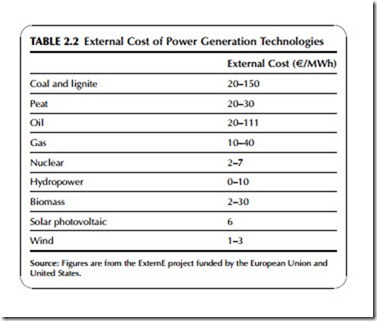EXTERNALITIES
Risk and prices volatility aside, does the basic economic equation described before take account of all the factors involved in generating electricity? There is a growing body of opinion that says no. It says that there are other very impor- tant factors that need to be taken into account too. These are generally factors such as the effect of power production on the environment and on human health, factors that society pays for but not the electricity producer or consumer directly. These factors are called externalities.
A major study carried out by the European Union (EU) with support from the United States over a decade in the 1990s estimated that the cost of these externalities within the EU, excluding the cost of global warming, were equivalent to between 1% and 2% of EU gross domestic product.
The cost of electricity in the EU in 2001, when the report of the study was published, was around €40/MWh. External costs for a variety of traditional and renewable energy technologies as determined by the study are shown in Table 2.2. Actual external costs vary from country to country and the table
shows the best and worst figures across all countries. These figures indicate that coal combustion costs at least an additional €20/MWh on top of the €40/MWh paid by the consumer, and could cost as much as an additional €150/MWh. Gas-fired generation costs at least an additional €10/MWh, while the external costs for nuclear and most renewable technologies were a fraction of this.
If consumers were forced to pay these external costs—by the imposition by governments of some form of surcharge, for example—the balance in the basic equation to determine the cost of electricity would shift in favor of all the non- combustion technologies. Of course, such a move would initially penalize consumers because a high proportion of the world’s electricity comes from fossil fuel and the capacity cannot be replaced overnight. It would not suit fossil fuel producers either and it would drive up manufacturing prices, initially at least, affecting global economics. Over the long term, however, if the analysis is correct, everyone would benefit.
